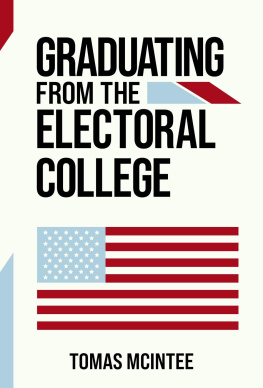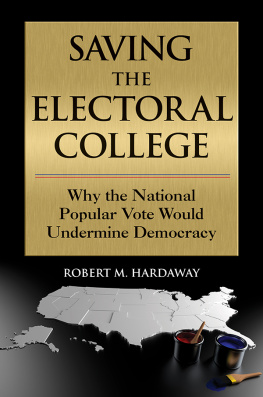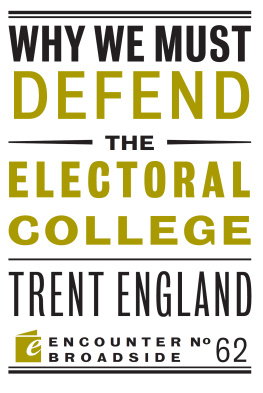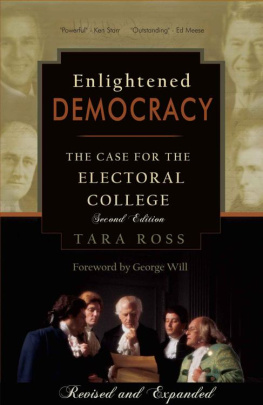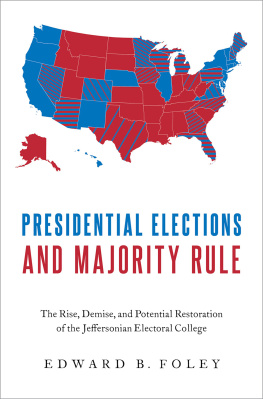Tomas J. McIntee - Graduating from the Electoral College
Here you can read online Tomas J. McIntee - Graduating from the Electoral College full text of the book (entire story) in english for free. Download pdf and epub, get meaning, cover and reviews about this ebook. City: Chapel Hill, year: 2023, publisher: Hurricane Lamp Press, genre: Science / Politics. Description of the work, (preface) as well as reviews are available. Best literature library LitArk.com created for fans of good reading and offers a wide selection of genres:
Romance novel
Science fiction
Adventure
Detective
Science
History
Home and family
Prose
Art
Politics
Computer
Non-fiction
Religion
Business
Children
Humor
Choose a favorite category and find really read worthwhile books. Enjoy immersion in the world of imagination, feel the emotions of the characters or learn something new for yourself, make an fascinating discovery.
- Book:Graduating from the Electoral College
- Author:
- Publisher:Hurricane Lamp Press
- Genre:
- Year:2023
- City:Chapel Hill
- Rating:5 / 5
- Favourites:Add to favourites
- Your mark:
Graduating from the Electoral College: summary, description and annotation
We offer to read an annotation, description, summary or preface (depends on what the author of the book "Graduating from the Electoral College" wrote himself). If you haven't found the necessary information about the book — write in the comments, we will try to find it.
Together, they are collectively known as the Electoral College, an institution that is protected by a dizzying array of myths and misunderstandings. This book argues incisively that the Electoral College neither lives up to the Founding Fathers expectations nor the modern arguments offered in its defense.
Drawing on a thorough analysis that includes every single presidential election from 1788 to 2020, Tomas McIntee finds that the Electoral College does not have a systematic bias in favor of small states, rural voters, or either of the two major political parties. Instead, it is chaotic; it favors large battleground states, rewards regionally divisive candidates, and is more susceptible to everything from fraud to bad weather.
Its time to graduate from the Electoral College.
Advance praise for Graduating from the Electoral College:
McIntee gives a comprehensive critique of the Electoral College that includes a consideration of its mathematical failings An analytically incisive account of the Electoral Colleges foibles.
- Kirkus Reviews
In addition to taking readers on a journey of the Electoral Colleges role in every election through 2020, McIntees classification of pivotal, critical, and crucial states will be quite useful to scholars, pundits, and even casual observers of the Electoral College. This is an accessible book that will be especially attractive to critics of the Electoral College.
- Robert Alexander
Author of Representation and the Electoral College
To say that Graduating from the Electoral College is key to understanding the American democratic process is an understatement. This is the book that should be assigned reading from high school upwards, required background reading for any educated voter who wants to enter the modern fray of controversial discussions with more than innuendo and vague notions of the Colleges history, intentions, and relevance to the power struggles that affect this nation.
-D. Donovan
Senior Reviewer, Midwest Book Reviews
Once their utility passed, three-corner hats, outdoor privies, and horse-drawn carriages were dismissed. It is long past time to drop another eighteenth century relic; one that threatens our democracy: the US Electoral College. This is where, not yours, but the votes of 538 essentially anonymous people elect the President of the US! For political reasons, reform is difficultuntil enough people speak out. An excellent place to learn about its history and dangers is this book by McIntee.
-Donald G. Saari
Author of Chaotic Elections! A Mathematician Looks at Voting
Distinguished Research Professor, University of California, Irvine
This book is a masterpiece, a real page-turner for anyone with an interest, either professional or recreational, in the bizarre system the most powerful country in the world uses to elect the most powerful person in the world. While the author precedes and follows his analysis making no mistake about his opinion of the Electoral College, his analysis remains fair and unbiased, and incredibly thorough. The founders can be forgiven for the flaws in the Electoral College, as they were working without history or context. Later generations might not be so easy on us, though, for allowing partisan politics and misguided perceptions to keep us from moving on from it.
-Rick Klima
Co-author of The Mathematics of Voting and Elections: A Hands-On Approach
Tomas J. McIntee: author's other books
Who wrote Graduating from the Electoral College? Find out the surname, the name of the author of the book and a list of all author's works by series.

